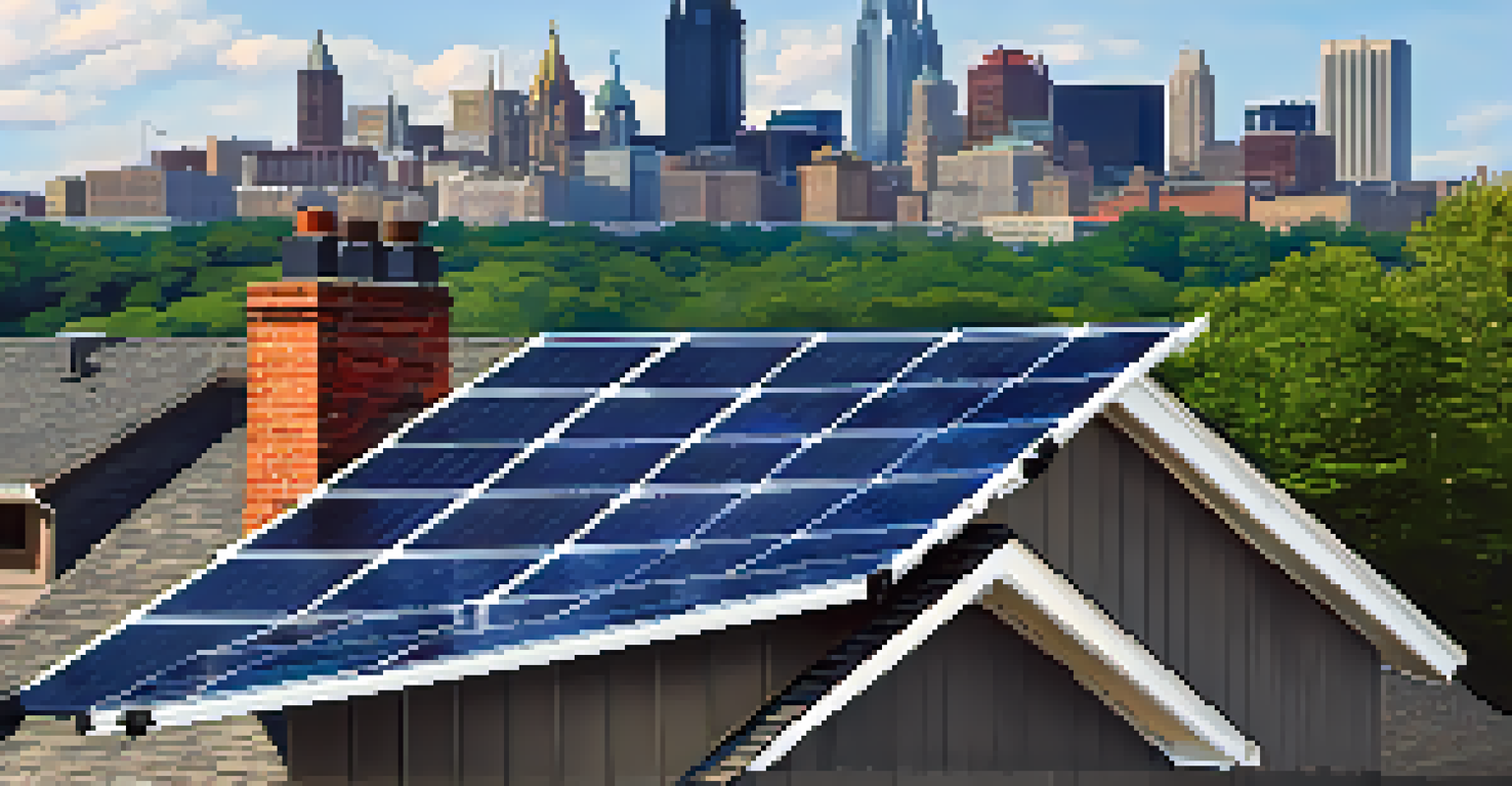The Role of Renewable Energy in Pittsburgh's Greener Future

Understanding Pittsburgh's Energy Landscape
Pittsburgh has a rich history rooted in steel and coal, but as the world shifts toward cleaner energy, the city is at a crossroads. The traditional energy landscape is evolving, with a growing emphasis on sustainability. This transformation is not just necessary; it’s an opportunity for Pittsburgh to reinvent itself and lead the charge in adopting renewable energy sources.
The future will be green, or not at all.
The city’s commitment to reducing its carbon footprint aligns with national and global efforts to combat climate change. By harnessing renewable energy, Pittsburgh can move away from its reliance on fossil fuels, paving the way for a greener future. This transition is essential for improving air quality and public health, benefitting both residents and the environment.
With a focus on innovation and technological advancements, Pittsburgh is becoming a hub for renewable energy initiatives. Investments in solar, wind, and other clean energy projects are not only creating jobs but also fostering a sense of community. This shift signifies a collective commitment to a sustainable future for all Pittsburghers.
The Rise of Solar Energy in Pittsburgh
Solar energy is becoming a significant player in Pittsburgh's renewable energy strategy. With the city receiving plenty of sunlight throughout the year, solar panels are an effective solution for harnessing this abundant resource. Homeowners and businesses are increasingly investing in solar technology, which not only reduces electricity bills but also contributes to a cleaner environment.

Community solar projects are popping up in various neighborhoods, allowing residents who may not have suitable rooftops to benefit from solar energy. These initiatives create shared solar power systems that democratize energy access and empower local communities. As more people engage with solar energy, the momentum for a sustainable future grows stronger.
Pittsburgh's Shift to Renewable Energy
Pittsburgh is transitioning from its traditional energy sources to renewable options, focusing on sustainability and a cleaner future.
In addition to individual installations, Pittsburgh is seeing municipal efforts to integrate solar energy into public infrastructure. Installing solar panels on schools, libraries, and other public buildings demonstrates the city's commitment to sustainability. This approach not only serves as a model for other cities but also educates residents about the benefits of renewable energy.
Wind Energy: A Growing Force in the Region
While Pittsburgh may not be known for its wind farms, the potential for wind energy in the surrounding areas is significant. Wind turbines are becoming a viable solution for generating clean energy, especially in the nearby Appalachian region. By tapping into this natural resource, Pittsburgh can diversify its energy portfolio and reduce reliance on traditional fuels.
Investing in clean energy is not just good for the planet; it's good for the economy.
Local governments and organizations are exploring partnerships to develop wind energy projects that can supply power to the city. This collaborative approach not only harnesses wind energy but also creates economic opportunities for the region. As wind energy becomes more prevalent, it will play a crucial role in reducing greenhouse gas emissions and enhancing energy security.
Moreover, the advancements in wind turbine technology have made it possible to generate energy even in areas with lower wind speeds. This means that even the Pittsburgh area can benefit from wind energy solutions. As a result, residents can look forward to a future where clean energy sources are diverse and abundant.
Energy Storage: Key to Renewable Energy Success
As Pittsburgh embraces renewable energy, energy storage solutions will be essential to ensure reliability. Energy storage systems, such as batteries, allow for the capture and storage of excess power generated by solar and wind sources. This stored energy can be used during peak demand times or when production is low, creating a more resilient energy system.
The integration of energy storage technologies can also help stabilize the grid, making it easier to manage fluctuations in energy supply and demand. By investing in these systems, Pittsburgh can enhance its energy independence and reduce the risk of power outages. This not only benefits consumers but also supports the overall stability of the region’s energy infrastructure.
Solar Energy is on the Rise
The city is increasingly adopting solar energy through individual installations and community projects, enhancing accessibility and awareness.
Furthermore, advancements in energy storage technology are continuously improving efficiency and affordability. As these systems become more accessible, Pittsburgh residents can take advantage of renewable energy without worrying about reliability. This shift represents a significant step toward a sustainable and dependable energy future.
Community Engagement in Renewable Initiatives
Community involvement is crucial to the success of Pittsburgh's renewable energy efforts. Local organizations and initiatives are working to educate residents about the benefits of renewable energy and how they can participate. By fostering awareness and engagement, these programs empower individuals to take action toward a greener future.
Workshops, informational sessions, and community events are surfacing across the city, making it easier for residents to learn about renewable energy options. These resources provide valuable insights into solar installations, energy efficiency, and sustainability practices. When communities are informed, they can make better choices that contribute to the city's overall energy goals.
Moreover, neighborhood solar co-ops are emerging as a popular way for residents to band together and invest in solar energy. By pooling resources, residents can access discounts and incentives that make renewable energy more affordable. This sense of community not only builds trust but also strengthens the push for a sustainable Pittsburgh.
Policy Support for Renewable Energy Growth
Policy plays a significant role in shaping Pittsburgh's renewable energy landscape. Local government initiatives and regulations are designed to support the growth of clean energy technologies. These policies can include tax incentives, grants, and streamlined permitting processes that facilitate renewable energy projects.
By creating a favorable environment for renewable energy development, policymakers can attract investments and encourage innovation. This proactive approach not only supports economic growth but also reinforces Pittsburgh's commitment to sustainability. When policies align with community goals, the potential for renewable energy expansion becomes even greater.
Economic Growth from Renewables
Investing in renewable energy not only addresses environmental challenges but also stimulates job creation and economic opportunities for Pittsburgh.
Additionally, collaboration between public and private sectors is essential for driving renewable energy initiatives. Partnerships can lead to shared resources, expertise, and funding, enabling a more robust renewable energy ecosystem. As these collaborations flourish, Pittsburgh becomes a shining example of how effective policy can promote a greener future.
The Economic Benefits of Renewable Energy
Investing in renewable energy is not just an environmental imperative; it’s also an economic opportunity for Pittsburgh. The growth of the renewable energy sector creates jobs in manufacturing, installation, and maintenance, providing stable employment for local residents. As the demand for clean energy solutions increases, so does the potential for job creation.
Furthermore, renewable energy can lead to cost savings for both individuals and businesses. By reducing dependence on fossil fuels, Pittsburgh can lower energy costs in the long run. This financial relief can have a ripple effect throughout the local economy, allowing businesses to invest more in their operations and communities to thrive.

As Pittsburgh continues to embrace renewable energy, it positions itself as a leader in the green economy. This shift not only enhances the city’s reputation but also attracts new investments and talent. A robust renewable energy sector can elevate Pittsburgh’s economic landscape, ensuring a brighter future for generations to come.